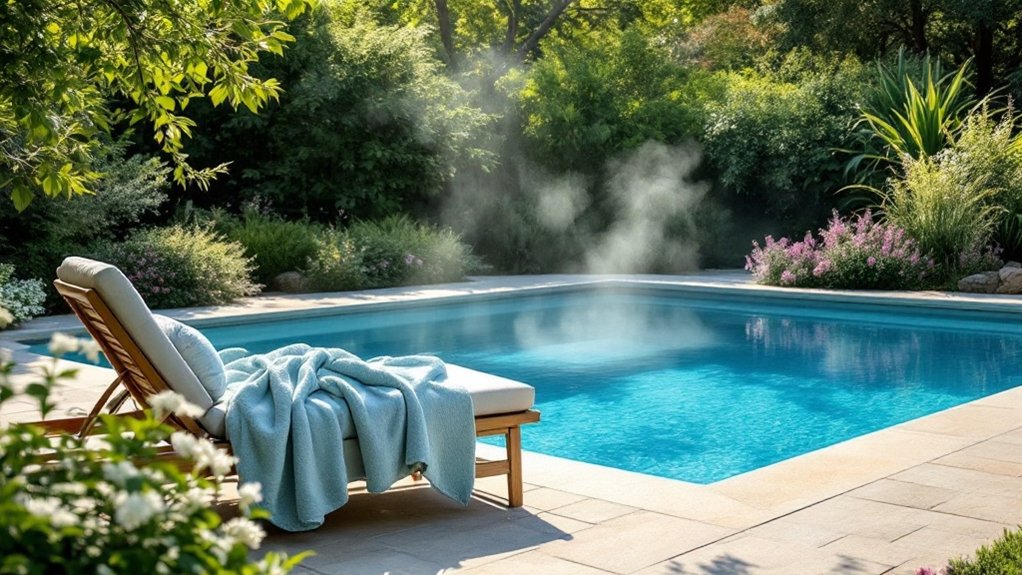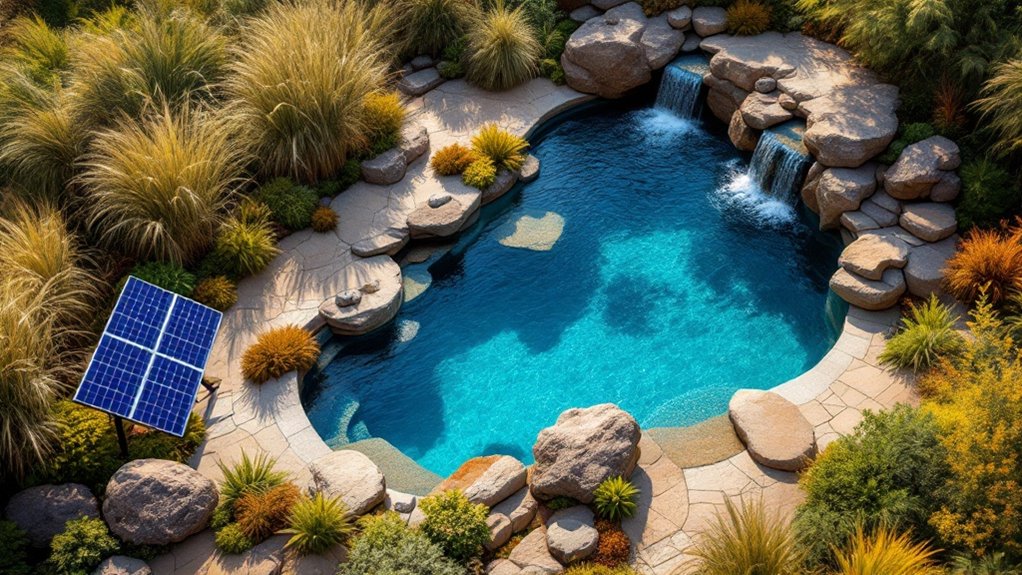Transforming a pool into an eco-friendly oasis is a practical choice for environmentally conscious homeowners. Sustainable heating options, such as solar pool heating systems and heat pumps, offer significant benefits. These technologies not only reduce energy consumption but also help maintain comfortable water temperatures. However, the decision involves various factors. Understanding the different options and their implications can lead to a more enjoyable and responsible swimming experience. What are the best choices for your pool?
The Benefits of Eco-Friendly Pool Heating
While many pool owners seek to extend their swimming season, eco-friendly pool heating options offer a sustainable solution that benefits both users and the environment. These systems typically utilize renewable energy sources, reducing reliance on fossil fuels and lowering greenhouse gas emissions. By adopting eco-friendly heating methods, users can enjoy significant cost savings on energy bills over time, as these systems often require less energy to operate. Additionally, they promote a healthier swimming environment by minimizing chemical usage associated with traditional heating methods. Eco-friendly pool heating options also contribute to the longevity of the pool equipment, as they usually involve less wear and tear. Overall, these solutions provide a viable way to enjoy extended swimming seasons without compromising environmental integrity.
Solar Pool Heating Systems
Solar pool heating systems offer a sustainable approach to maintaining comfortable water temperatures while reducing energy costs. Understanding the benefits of solar heating, along with the installation process, is essential for pool owners considering this eco-friendly option. This discussion will explore both the advantages and the steps involved in implementing solar technology for pool heating.
Benefits of Solar Heating
Harnessing the sun’s energy, solar pool heating systems offer a range of benefits that make them an attractive option for environmentally conscious pool owners. These systems considerably reduce energy consumption by utilizing a renewable resource, leading to decreased utility bills over time. Additionally, solar heating contributes to a reduced carbon footprint, promoting sustainability and protecting the environment. With minimal maintenance required, they provide long-term reliability and durability. Moreover, solar pool heating extends the swimming season, allowing pool owners to enjoy warm water even during cooler months. By investing in solar technology, users not only enhance their leisure experience but also support a greener future, making solar heating a wise choice for eco-friendly pool management.
Installation Process Overview
Installing a solar pool heating system involves several key steps that guarantee peak performance and efficiency. First, the site is assessed to determine the ideal location for solar collectors, ensuring maximum sun exposure. Next, the appropriate type and size of collectors are selected based on the pool’s dimensions and local climate. Once the materials are gathered, the collectors are mounted on a roof or a ground rack, securely attached to handle potential weather conditions. Piping is then installed to connect the collectors to the pool’s filtration system, allowing for seamless water circulation. Finally, the system is tested for leaks, and any necessary adjustments are made to enhance performance. With proper installation, solar heating can provide an eco-friendly solution for pool warmth.
Heat Pumps: An Efficient Alternative
Heat pumps offer an innovative solution for pool heating that combines efficiency and sustainability. These systems work by extracting heat from the surrounding air and transferring it to the pool water, making them remarkably energy-efficient. Unlike traditional heating methods, heat pumps consume considerably less electricity, resulting in lower operational costs and a reduced carbon footprint. They are capable of maintaining a stable water temperature, ensuring comfortable swimming conditions throughout the season. Additionally, heat pumps can operate effectively in various climates, making them a versatile choice for pool owners. Their long lifespan and minimal maintenance requirements further enhance their appeal as an eco-friendly heating option. Ultimately, heat pumps present an intelligent alternative for those looking to heat their pools sustainably. Furthermore, they can be an excellent choice for homeowners seeking a reliable and energy-efficient solution for year-round pool warmth.
Gas Pool Heaters vs. Eco-Friendly Options
When comparing gas pool heaters to eco-friendly options, the stark differences in efficiency and environmental impact become evident. Gas heaters, while effective for quick heating, rely on fossil fuels, contributing to greenhouse gas emissions and higher operational costs. In contrast, eco-friendly alternatives, such as heat pumps and solar heaters, harness renewable energy, considerably reducing carbon footprints. Heat pumps operate efficiently by transferring heat from the air or ground, while solar heaters utilize sunlight, offering a sustainable and cost-effective solution over time. While initial investments for eco-friendly systems may be higher, their long-term savings and environmental benefits make them a compelling choice for conscientious pool owners. Ultimately, the decision hinges on balancing immediate needs with future sustainability. Additionally, investing in energy-efficient systems can further enhance the overall performance and reduce operational costs.
Solar Covers and Blankets for Heat Retention
Solar covers and blankets serve as an effective means of heat retention for swimming pools, complementing eco-friendly heating systems. These covers, typically made from durable, UV-resistant materials, create a barrier that minimizes heat loss during cooler nights and windy days. By trapping the sun’s warmth during the day, they can notably raise water temperatures, making swimming more enjoyable without additional energy costs. In addition, solar covers also reduce evaporation, conserving water and chemical usage, which benefits both the environment and pool maintenance. Available in various sizes and styles, they can easily be fitted to most pool shapes. Investing in a solar cover not only enhances comfort but also aligns with sustainable practices, promoting energy efficiency in pool heating. Regular maintenance of pool equipment ensures optimal performance and longevity, making it essential to consider professional pool cleaning services for comprehensive care.
The Role of Pool Insulation
Pool insulation plays an essential role in maintaining heat and reducing energy costs. Various insulation materials, such as foam boards and reflective barriers, offer differing levels of effectiveness and benefits. Proper insulation not only enhances comfort but also contributes to the overall efficiency of eco-friendly pool heating systems.
Insulation Materials Comparison
Effective insulation is essential for maintaining ideal water temperatures and reducing energy consumption in swimming pools. Various insulation materials are available, each with distinct properties and effectiveness. Rigid foam boards, often made from polystyrene, provide high thermal resistance and moisture resistance, making them suitable for pool walls and floors. Spray foam insulation offers excellent sealing capabilities, conforming to irregular shapes and providing strong thermal performance. Fiberglass insulation, while less common, is also used for its non-combustible properties and durability. Reflective insulation, including radiant barriers, helps reduce heat loss by reflecting thermal radiation. When comparing these materials, factors such as cost, installation ease, and long-term performance are vital for homeowners aiming to optimize their pool’s energy efficiency.
Benefits of Proper Insulation
Although many homeowners may overlook insulation, its role in maintaining ideal water temperatures in swimming pools is vital. Proper insulation minimizes heat loss, allowing pools to retain warmth more efficiently, which ultimately reduces energy consumption and lowers heating costs. Insulated pools can maintain comfortable temperatures for longer periods, extending the swimming season and enhancing user enjoyment. Additionally, insulation helps mitigate evaporation, which not only conserves water but also minimizes the need for chemical replenishment. By investing in effective insulation materials, homeowners can create a more sustainable and eco-friendly pool environment. Overall, proper insulation serves as an important component in optimizing pool performance, enhancing energy efficiency, and contributing to a greener lifestyle.
Using a Pool Timer for Energy Savings
When homeowners prioritize energy efficiency in their pool heating strategies, integrating a pool timer can greatly enhance savings. By allowing users to schedule heating cycles, pool timers guarantee that the heating system operates only during peak usage times. This minimizes unnecessary energy consumption, especially during cooler nights when the pool may not be in use. Additionally, timers can be programmed to heat the pool shortly before occupants plan to swim, maintaining a comfortable temperature without excessive energy expenditure. Many modern timers also offer smart technology, enabling remote control and monitoring via smartphones. Overall, utilizing a pool timer not only supports eco-friendly practices but also contributes to significant cost savings, making it a practical addition to any energy-conscious pool setup. Furthermore, regular equipment inspections can help ensure that heating systems are functioning efficiently, further enhancing energy savings.
Combining Heating Solutions for Maximum Efficiency
Integrating multiple heating solutions can greatly enhance a pool’s energy efficiency. By combining solar heaters with heat pumps or gas heaters, pool owners can optimize their heating systems for varying weather conditions. Solar panels can provide a renewable energy source during sunny days, while heat pumps maintain temperature during cooler evenings. This synergy reduces reliance on any single system, leading to lower energy costs and a smaller carbon footprint. Additionally, using a combination of heating methods allows for more consistent water temperature, ensuring comfort for swimmers year-round. Ultimately, this approach maximizes the benefits of each system, enhancing overall performance and sustainability without sacrificing convenience or enjoyment. Regular maintenance of the heater fan motor is also crucial for consistent heating, ensuring that all systems work efficiently together.
Maintenance Tips for Eco-Friendly Systems
Proper maintenance of eco-friendly pool heating systems is essential for ensuring their efficiency and longevity. Regularly inspecting and cleaning solar panels or heat exchangers helps maximize performance. It is advisable to remove debris, such as leaves and dirt, that can obstruct sunlight or airflow. Checking for leaks in plumbing connections is vital, as even minor leaks can lead to significant energy loss. Additionally, monitoring fluid levels and ensuring proper insulation around pipes can enhance heat retention. Scheduling a professional inspection annually can identify potential issues before they escalate. Finally, keeping the surrounding area free from obstructions allows for ideal sunlight exposure, maximizing the benefits of solar heating systems. Following these tips will help maintain the system’s effectiveness and sustainability.
The Long-Term Savings of Sustainable Heating
While initial investments in sustainable heating options for pools may seem intimidating, the long-term savings they provide can greatly outweigh these upfront costs. Eco-friendly heating systems, such as solar panels and heat pumps, typically reduce energy bills considerably. With lower operational costs and minimal maintenance requirements, homeowners can expect substantial savings over time. Additionally, many sustainable systems have longer lifespans compared to traditional heaters, further enhancing their cost-effectiveness. Incentives and rebates may also be available, making the switch more financially viable. Over several years, these factors culminate in a favorable return on investment, ensuring that the eco-friendly choice not only benefits the environment but also contributes positively to the homeowner’s financial health.
Frequently Asked Questions
How Much Do Eco-Friendly Pool Heating Systems Typically Cost?
Eco-friendly pool heating systems generally range from $1,500 to $7,000, depending on the type, size, and installation costs. These systems often provide long-term savings on energy bills, making them a worthwhile investment for many homeowners.
Are There Any Government Incentives for Installing Eco-Friendly Pool Heaters?
Government incentives for installing eco-friendly pool heaters vary by location. Many regions offer tax credits, rebates, or grants to encourage energy-efficient upgrades, promoting sustainability while potentially reducing the overall financial burden on homeowners investing in these systems.
Can I Use Eco-Friendly Heating in Any Type of Pool?
Eco-friendly heating options can be utilized in various types of pools, including above-ground and in-ground models. However, compatibility may vary based on specific systems, so consulting a professional is recommended for best results.
How Long Does It Take to Heat a Pool With Eco-Friendly Options?
Heating a pool with eco-friendly options typically takes longer than traditional methods. Factors affecting heating time include the pool’s size, environmental conditions, and the specific heating technology utilized, often resulting in several hours to a few days.
What Are Common Misconceptions About Eco-Friendly Pool Heating?
Many individuals mistakenly believe eco-friendly pool heating is ineffective or too expensive. Others assume it requires complicated technology. In reality, these systems are often efficient, cost-effective, and increasingly user-friendly, providing sustainable options for pool owners.
Conclusion
In summary, transforming a pool with eco-friendly heating options not only enhances the swimming experience but also promotes sustainability. By embracing technologies such as solar pool heating systems and heat pumps, pool owners can considerably reduce energy consumption and utility costs while contributing to a healthier environment. Additionally, implementing strategies like solar covers and timers can further optimize efficiency. Ultimately, investing in these sustainable solutions leads to long-term savings and a positive impact on the planet.




